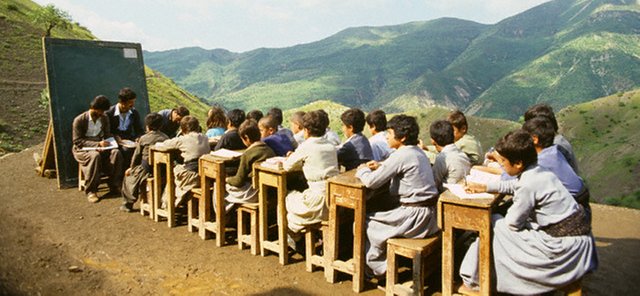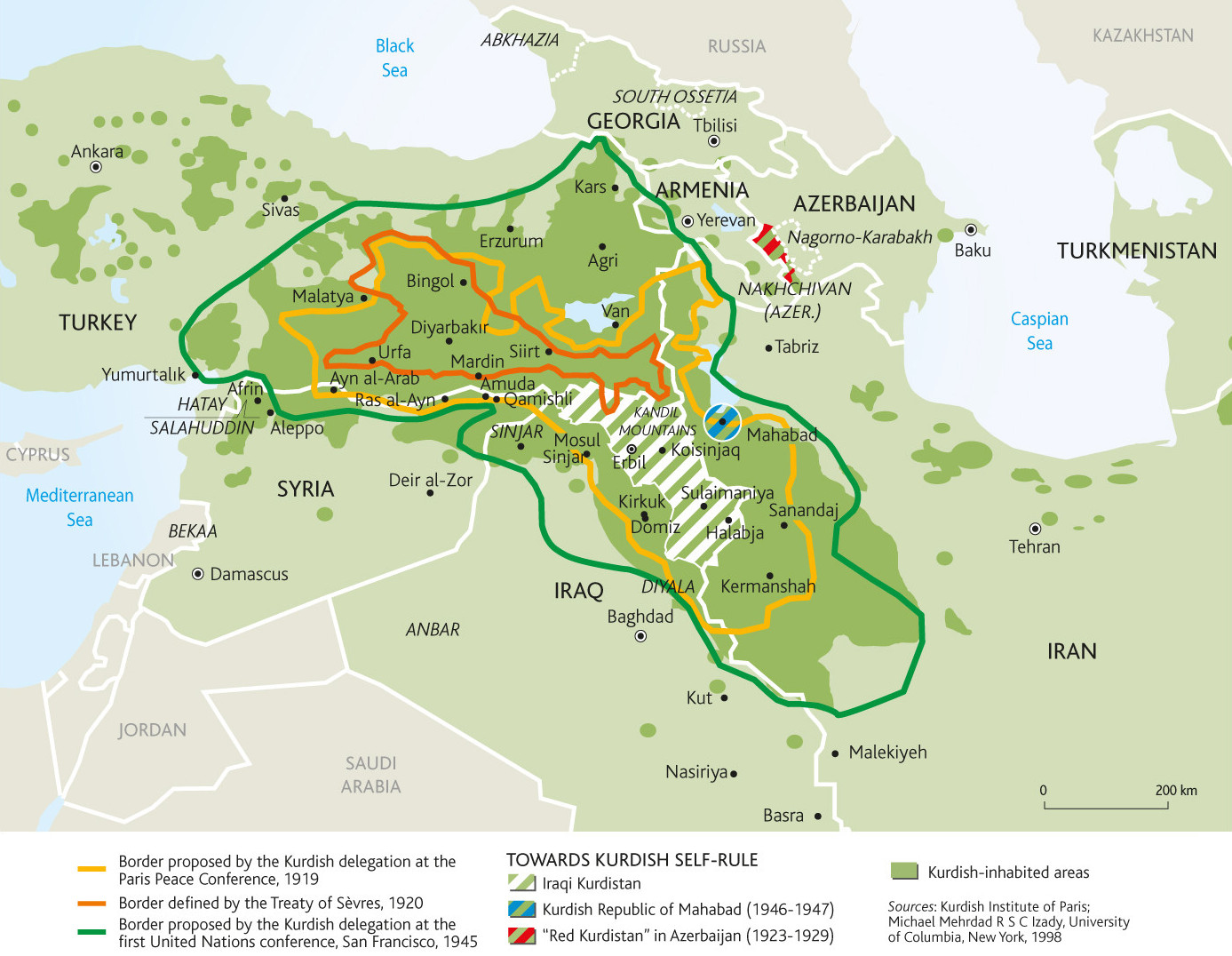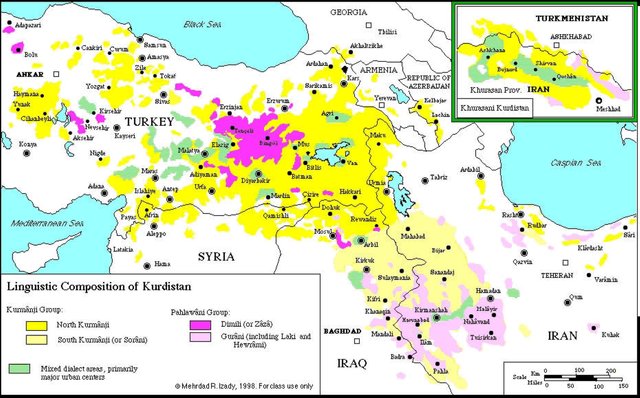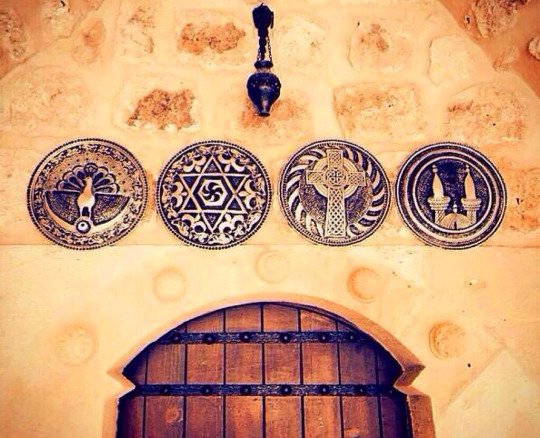I'd like to share more about the Kurds. I would like you to discover our people, our nation, our history, our culture and traditions, our beliefs and myths, our songs and floklore, our politics and stuggles... However, before all that I need you to understand the basics, a few facts and figures. Let's call this a summary or an introduction.

Image source : http://elcoyote.org/democracia-radical-a-primeira-linha-contra-o-fascismo/
Who are the Kurds ?
The Kurds are one of the indigenous people of the middle east. They inhabit the mountainous region of once renowned Mesopotamia, as you might know as the craddle of civilation (you know where the first traces of agriculture were found dating back over 5000 years). The Kurds are ethnically different from the Turks, the Arabs and the Persians that inhabit the area. They are considered to be the descendants of the ancient Medes.
Where are Kurds located ?
The nation of the Kurds, referred to as "Kurdistan" (meaning "land of the Kurds") is divided within mainly 4 states (5 if we want to be precise). North Kurdistan (referred to as Bakur in Kurdish) is located in south east Turkey. East Kurdistan (referred to as Rojhilat) is located in west Iran. South Kurdistan (Bashur) in the north of Iraq and east Kurdistan (Rojava) in the north of Syria. The 5th, least well known, is red Kurdistan which was once administrated by the soviets from 1923 to 1929 and was located between Armenia and Azerbaijan. If Kurdistan were a united independent country, with a surface area of around 409 000 Km², it would be about the 58th largest nation state in the world.
(
https://en.wikipedia.org/wiki/List_of_countries_and_dependencies_by_area)

Source : Kurdish Institute of Paris http://www.institutkurde.org/en/kurdorama/map_of_kurdistan.php
How many are there ?
Kurds are the fourth largest ethnic group in the middle east and one of the largest groups in the world without a nation state of their own. The estimations are still a bit rough, as Kurdish identity was denied and oppressed for a long time within each of the countries that hosted the Kurdish population. Some Kurds were assimilated into Turkish, Arab or Persian (so forgot they ever were Kurdish), some were never given citizenship so were never considered and others to afraid to identify themselves as Kurds. So the numbers are always pretty approximative.
If we consider the current estimates established by the Kurdish Institute of Paris, there is an average of 40 million Kurds in and around the borders of what would be Kurdistan and 3 to 5 million outside. If Kurdistan were a united independent country, with an average population of 45 million, it would be the 31st among the countries according to population size (just behind Spain and ahead of Argentina or Canada).
https://en.wikipedia.org/wiki/List_of_countries_and_dependencies_by_population
What language do they speak ?
The Kurds speak Kurdish with mainly 4 more or less distinctive dialects. The majority of Kurds speak "Kurmanji", mostly in north Kurdistan and west Kurdistan. The "Sorani" dialect is spoken mainly in the south and parts of east Kurdistan. "Gorani" mostly spoken in east Kurdistan. Then there is "Zaza" spoken in mostly in regions inhabited by Alevi Kurds (like Dersim or Bingöl). For many years, many Kurds were prohibited from learning, teaching or speaking their mother tongue, that's why a lot of Kurds can't speak or can only speak a little Kurdish. In countries like Turkey, Kurdish is still forbidden to be taught. Hence the fact, Zaza (which originally should be my mother tongue) is now a dying language.

Image source : http://www.institutkurde.org/en/kurdorama/map_of_kurdistan.php
What are their religions ?
Even though the large majority of Kurds (80%) identify themselves as sunni muslims, the Kurds are still pretty religiously diverse. There are shiite kurds, alevi Kurds, yazidis Kurds (yazidism derived from zoroastrianism, one of the oldest monotheist religions), christian kurds, jewish and atheist Kurds. Most Kurds are progressive, respectful, tolerant and open-minded towards other beliefs as it should be among all people.
 Symbol of peaceful religious coexistence in Mardîn.
Symbol of peaceful religious coexistence in Mardîn.
Yezidism, Judaism, Christianity and Islam.
Source of image : https://fr.pinterest.com/pin/101612535321861431/
Thank you for your attention,
@ronahi




That is new to me, so thank you for that, and we will be waiting for more!
Thank you for showing interest @aurimo.
Hello @ronahi, great post, and very informative. Maybe you could do a post about Kurdish food? I love trying new dishes from around the world :)
Hey Thank you @nickdavison, I sure will post about a few dishes :)
Harika bir yazı olmuş kardeşim teşekkürler
Sagol Kardeşim :)
Thank you for sharing this information,@ronahi
. I was aware of the Kurdish people but not the geographical presence in countries as shown inthe map.
Very informative, will follow more on Kurdistan
-@bookmanpage
You're welcome @bookmanpage. I'm glad you took interest in the Kurds. I took a look at your posts and I like your sketches, I did a few a sketches myself, I might share them some time. Thank you, so I'll follow you back.